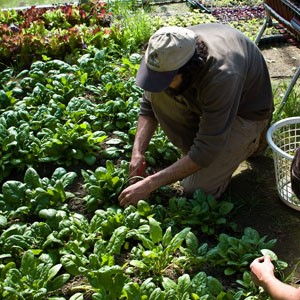HB 231 / SB 700: Fair Property Taxes for Small Farmers
Clarifying the definition of “agricultural use” for tax valuation

Although Texas law provides for “agricultural valuation” of land used primarily for raising food, many farmers across the state have experienced problems in qualifying for such valuation due to bias against sustainable farming methods, urban farms, and produce farmers.
HB 231 and SB 700, the Fair Taxes for Small Farmers bill, provides for fair, consistent application of agricultural valuation. Last session, a very similar bill (HB 1900) was passed by the House by a vote of 135-4.
The Tax Code provides that land be appraised as qualified agricultural land if it is “devoted principally to agricultural use to the degree of intensity generally accepted in the area.” Unfortunately, many county appraisal districts have applied the provision in ways that exclude legitimate farms.
HB 231 and SB 700 have slightly different language, but both clarify the Tax Code by:
- Specifying that fruit and vegetable production qualify as “agricultural uses.” There have been multiple cases of county tax assessors asserting that growing vegetables isn’t agriculture, or applying guidelines developed for row crops instead of vegetable production so as to exclude them.
- Directing the Comptroller to convene stakeholder groups to develop guidelines to address under what conditions small acreages, different types of production methods, and diversified farms qualify for agricultural valuation.
To help limit who is eligible and prevent abuses, the bill includes specific factors to be considered for small acreages, including:
- the financial investment of the producer in agricultural use of the land,
- the degree of active management for agricultural use, and
- the percentage of the land being used for agricultural uses.
The bill also prevents landowners who qualify under the small acreage provision from converting to wildlife valuation; this provision was requested by county appraisers as an additional safeguard.
In addition, the landowner must still show that the land is devoted principally to agricultural use, and has been for at least five of the preceding seven years. The landowner will remain subject to five years of rollback taxes if the property ceases to be used for agricultural purposes.
This proposal does not seek to increase the number of landowners who are entitled to open-space valuation; rather, it merely ensures that people who should already qualify for agricultural valuation under the Texas Constitution are not inappropriately excluded by local authorities.
Read the entire text of HB 231 here and the text of SB 700 here.
Take Action
Call or email your State Representative and Senator to urge him or her to support HB 231 and SB and help move the bill forward. A phone call has the greatest impact and allows you to find out if they supported the cottage foods bill in 2013 (if they were in office). Remember to keep the conversation polite and to-the-point.
You can find out who your representatives are by going to www.fyi.legis.state.tx.us or calling the Texas Capitol Switchboard at 512-463-4630.
If you call after hours, you can simply leave a message:
“Hi, my name is ____, and I am a constituent. I am calling to urge Representative/Senator ______ to co-author HB 231/SB 700, the Fair Property Taxes for Small Farmers Bill, and to help the bill move forward as quickly as possible. I would like to know where my Representative/Senator stands on this issue, please. You can call me back at _________.”
If you prefer email, your Representative’s email address is simply FirstName.LastName@house.texas.gov, and your Senator’s email address is firstname.lastname@senate.texas.gov.
Action Alert: Deadline Extended to Submit Comments to FDA on GE Salmon
Thank you to everyone who has already submitted comments to the FDA about genetically…
Read More